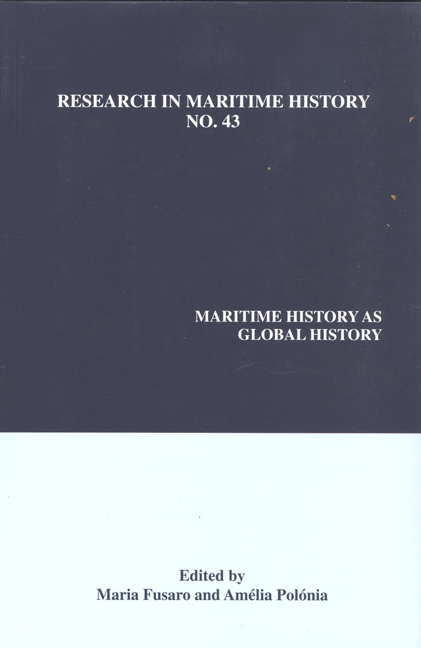Book contents
- Frontmatter
- Contents
- About the Editors
- Contributors' Notes
- “Maritime History: A Gateway to Global History?”
- “Behind the Atlantic Expansion: Flemish Trade Connections of Seville in 1620”
- “National and International Labour Markets for Sailors in European, Atlantic and Asian Waters, 1600-1850”
- “Maritime Expansion and (De)globalization? An Examination of the Land and Sea Trade in Seventeenth-Century Mughal India”
- “From Hold to Foredeck: Slave Professions in the Maritime World of the East India Company, c. 1660-1720”
- “Small Town Merchants, Global Ventures: The Maritime Trade of the New Julfan Armenians in the Seventeenth and Eighteenth Centuries”
- “Lighting up the World? Empires and Islanders in the Pacific Whaling Industry, 1790-1860”
- “Technological Advances in the Maritime Sector: Some Implications for Trade, Modernization and the Process of Globalization in the Nineteenth Century”
- “Lost in Calculation? Norwegian Merchant Shipping in Asia, 1870-1914”
- “Why Are the Major Oil Companies Selling Off their Fleets? The Case of Total”
- “Turning Maritime History into Global History: Some Conclusions from the Impact of Globalization in Early Modern Spain”
- “Maritime History as Global History? The Methodological Challenges and a Future Research Agenda”
“Why Are the Major Oil Companies Selling Off their Fleets? The Case of Total”
- Frontmatter
- Contents
- About the Editors
- Contributors' Notes
- “Maritime History: A Gateway to Global History?”
- “Behind the Atlantic Expansion: Flemish Trade Connections of Seville in 1620”
- “National and International Labour Markets for Sailors in European, Atlantic and Asian Waters, 1600-1850”
- “Maritime Expansion and (De)globalization? An Examination of the Land and Sea Trade in Seventeenth-Century Mughal India”
- “From Hold to Foredeck: Slave Professions in the Maritime World of the East India Company, c. 1660-1720”
- “Small Town Merchants, Global Ventures: The Maritime Trade of the New Julfan Armenians in the Seventeenth and Eighteenth Centuries”
- “Lighting up the World? Empires and Islanders in the Pacific Whaling Industry, 1790-1860”
- “Technological Advances in the Maritime Sector: Some Implications for Trade, Modernization and the Process of Globalization in the Nineteenth Century”
- “Lost in Calculation? Norwegian Merchant Shipping in Asia, 1870-1914”
- “Why Are the Major Oil Companies Selling Off their Fleets? The Case of Total”
- “Turning Maritime History into Global History: Some Conclusions from the Impact of Globalization in Early Modern Spain”
- “Maritime History as Global History? The Methodological Challenges and a Future Research Agenda”
Summary
A noteworthy feature of maritime transport is the abandonment by vertically-integrated oil companies of their shipping capacity. Vessels supplying crude oil to France under the French flag are now owned mostly by Norwegian or Belgian firms. In 1993 Total, France's sole “major,” withdrew from the business of transporting its oil and turned to chartering. The phenomenon is all the more paradoxical in that it seems to have been set off by legislation passed in 1992 to protect the merchant marine.
The aim of this essay is to explain the reasons for the withdrawal of oil companies from the shipping sector by focussing on Total, France's leading carrier, importer, refiner and retailer. The closure of the Suez Canal in 1967 accelerated a tanker building boom that had begun in the early 1960s. Very large crude carriers (VLCCs) became the order of the day. By the 1970s, the world's oil fleet was suffering from acute overcapacity. In 1974 Total stopped ordering tankers; four years later it began scaling down its fleet. Using Total's archives, the paper will assess the destabilizing impact on the company of the cyclical and highly competitive international shipping market. It will also consider the extent to which factors other than overcapacity contributed to the process of outsourcing its transport function. What were the roles of regulation, of the comparative advantage of flags of convenience or of the risks of ecological disasters? Our examination of the involvement of Total in the transportation of oil will begin in 1945.
Total is the successor to the Compagnie française des pétroles (CFP), founded on 24 March 1924 by Ernest Mercier at the behest of President Raymond Poincaré. Its purpose was to manage the share in the Turkish Petroleum Company which the San Remo Treaty of 24 April 1920 transferred from Deutsche Bank to France as war reparations. Mercier understood the need for a vertically-integrated company. On 19 March 1929 the CFP created its refining arm, the Compagnie française de raffinage (CFR), and on 31 December 1931 founded its wholly-owned transportation subsidiary, the Compagnie navale des pétroles (CNP). The CNP was intended to afford the CFP greater freedom and independence in its operations. Before the 1930s, France's needs for refined products were entirely met through imports. The proportion of re-fined petroleum was gradually reduced relative to crude.
- Type
- Chapter
- Information
- Maritime History as Global History , pp. 223 - 248Publisher: Liverpool University PressPrint publication year: 2010



